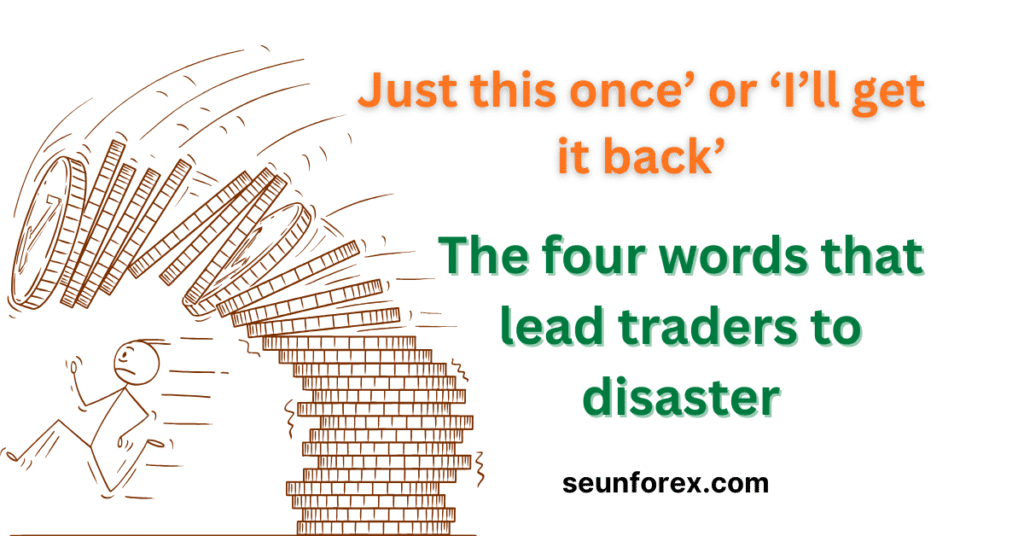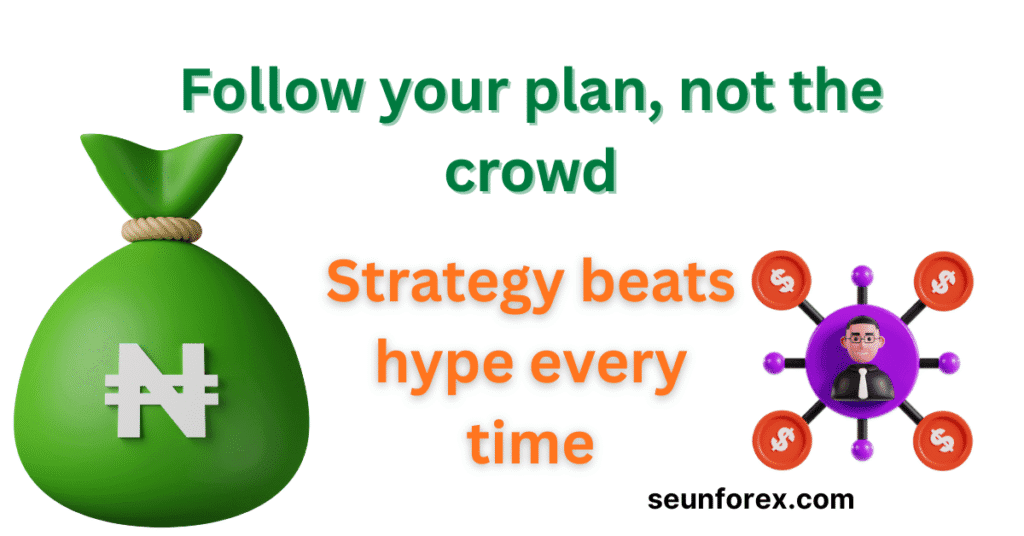
Lessons on trader psychology, emotional traps, and disciplined strategies that preserve your account.
🧠 From Emotion to Execution: How Language Shapes Trading Decisions
Picture this: it’s 2 a.m. in Lagos. The screen glows, charts flicker, and your fingers hover above the keyboard. One thought sneaks in: “Just this once.” Three small words. One decision. And suddenly, your account balance, confidence, and peace of mind start unraveling.
This isn’t drama. This is patterned trader behavior, the hidden reason why 90% of retail traders fail.
Markets don’t care about excuses, intelligence, or hope. They only react to your actions — and your actions are primed by self-talk.
“Your trading decisions are never in isolation — someone, somewhere, is responding to them.” — Anonymous Trader
This isn’t drama. This is patterned trader behavior, the hidden reason why 90% of retail traders fail.”
🚀 READY TO TRADE WITH DISCIPLINE?
Join thousands of Nigerian traders using Exness for:
• Instant Naira deposits & withdrawals
• Reliable execution during volatile markets
• Advanced risk management tools
• 24/7 Nigerian customer support
[CLICK HERE TO OPEN YOUR EXNESS ACCOUNT]
🔍 Why These Words Are Deadly

The four words — “Just this once,” “I’ll get it back,” “It’s different this time,” and “One more trade” — are more than casual phrases. They are psychological gateways to bad trading habits:
- Revenge trading — chasing losses emotionally, not logically
- Over-leveraging — risking more than your strategy allows
- Hope-mode — ignoring rules believing “it will work out”
- Ignoring risk management — the fastest path to a blown account
Recognizing these words is step one. Neutralizing their effect is step two.
🧠 Active vs. Reactive Thinking
In life, we’re taught to take initiative. In trading, the pros are reactive, not impulsive.
“The market doesn’t pay you to be active. It pays you to be patient.” — Mark Minervini
Professional traders wait for probability alignment. They don’t fight the market; they respond to it. Patience is calculated, controlled, and strategic.
🧍♂️ Logic vs. Crowd Psychology
Markets aren’t debates. They’re auctions.
Trendlines, Fibonacci levels, or analysis don’t matter unless the crowd moves with them. Prices are driven by psychology, not rationality.
- It’s not about being right — it’s about being aligned.
- You can’t control the market, only your reaction.
🔭 Speculation vs. Assumption
Prediction is for amateurs. Observation is for pros.
“I stand on a hill and watch two armies battle. When one starts to win, I join them.” — Tom Basso
Pros define clear conditions for every trade. They risk only when the market proves the setup. Assumption leads to avoidable losses. Confirmation leads to edge-based trading.
🥊 Ego vs. Humility
Trading punishes ego:
- Don’t cling to being right
- Don’t hold losers to prove a point
- Don’t marry a trade
“If you’re not willing to take a small loss, sooner or later you’ll take the mother of all losses.” — Ed Seykota
Professional traders cut losses fast, without regret or hesitation. Ego is the most expensive lesson in trading.
🎯 Risk vs. Calculated Risk
Trading is probability management, not prophecy.
Pros ask: “How much can I lose?” before they ask: “How much can I make?”
Example:
- 7 trades: small $1 loss each
- 3 trades: large $5 gain each
- Net = +$8 profit
This isn’t luck. It’s mathematical asymmetry, and mastering it separates winners from gamblers.
🧮 Goals vs. Probabilities
Retail traders chase arbitrary goals: $500 a day, 10% monthly return.
Pros chase high-reward setups, not numbers. They know: the market doesn’t care about your target — only your edge.
“You don’t trade because you’re bored. You trade because conditions demand it.” — Marty Schwartz
🥶 Emotion vs. Execution
Hope, fear, and anger don’t trade. Discipline does.
Rules > feelings. When a stop hits, pros close immediately. No praying, no hoping.
“When in doubt, get out.” — Pro Trading Rule
💰 One Big Hit vs. Many Small Edges
Forget home runs. Big gains come from stacked, disciplined trades.
Pros:
- Capture a chunk of a move
- Limit losses
- Leave some money on the table
This strategy builds long-term compounding, not short-term thrills.
📉 School Logic vs. Market Logic
In school: A + B = C.
In trading: A + B = maybe C… or Z… or disaster.
Markets are probabilistic. Professionals seek edge, not certainty.
🧠 Real Nigerian Trader Examples: Lessons From the Trenches

1. Lagos Day Trader – ₦100,000 Account
Used “I’ll get it back” after a loss, doubled down → 60% account loss in two days.
Lesson: Revenge trading destroys capital. Discipline saves accounts.
2. Abuja Swing Trader – EUR/USD
Waited for trend alignment across timeframes. ₦150,000 → ₦230,000 in 3 weeks.
Lesson: Patience + alignment = compounding success.
3. Port Harcourt Crypto Trader
Chased social media tips. Minor losses wiped accounts.
Lesson: Herd mentality kills profits. Stick to your strategy.
4. Nigerian Trader Using Exness Affiliate Setup
Leveraged Exness tools, 1% risk per trade → steady growth.
Lesson: Choose brokers that protect your edge.
“👉 PROTECT YOUR CAPITAL WITH EXNESS’ INSTANT WITHDRAWALS”
5. Kaduna Trader – Momentum Trap
Entered BTC spike without confirmation → 15% loss in 24 hours.
Lesson: Wait for probability alignment.
6. Ibadan Trader – Multi-Timeframe Champion
Aligned daily & weekly charts for USD/NGN → net +12% in 1 month.
Lesson: Multi-timeframe + patience beats reckless activity.
7. Nigerian Swing Trader – News Risk Lesson
Ignored economic announcements → 25% loss.
Lesson: Check news & economic calendar.
8. Lagos Tech Stock Trader
Waited for clean breakouts → profit = 35% in 6 weeks.
Lesson: Apply global trading principles locally.
9. Forex Trader Using Hedging
Hedged USD/JPY positions using EUR/USD correlation → controlled losses.
Lesson: Hedging is advanced risk management.
10. Young Trader Journaling Every Trade
Kept notes of entries, exits, emotions → reduced destructive patterns.
Lesson: Journaling builds awareness.
📊 Advanced Nigerian Trading Strategies
- Multi-Timeframe Confirmation – Align daily, 4-hour, hourly charts.
- Volatility-Adjusted Risk – Use ATR to scale stops.
- Sector Rotation in NSE – Trade leaders, avoid laggards.
- News-Event Avoidance – Avoid trades 30 mins before/after announcements.
- Edge Stacking – Combine trend, support/resistance, volume, candlestick.
- Micro-Lot Scaling – Partial entries & staged exits.
- Exness Tools for Nigerian Traders – Local deposits, risk management, real-time execution.
🔑 Common Mistakes in Nigerian Market
- Chasing hype on social media (Telegram, Twitter, WhatsApp)
- Over-leveraging NGN pairs
- Ignoring liquidity issues
- Failing to adjust for Naira volatility
🧠 Nigerian Trader Psychology
- FOMO – Buying after spikes, ignoring trend alignment
- Recency Bias – Chasing recent winners
- Ego & Status – Showing friends profits → over-trading
- Short-Termism – Obsessing over daily profits
Solution: Focus on process, follow rules, track metrics.
🏗️ Trader Routines & Pre-Trade Checklist
Morning Scan: Review indexes, sectors, news
Chart Review: Multi-timeframe confirmation, support/resistance, volume
Risk Allocation: Max 1–2% per trade
Execution Ritual: 60-second checklist: trend, structure, risk, exit
Post-Trade Review: Record reason for entry/exit, emotions, lessons
📣 Affiliate Tools & Broker Recommendation
Protect your edge with reliable brokers. For Nigerian traders:
- Exness – supports local deposits, risk management, low latency
Open an Exness Account — Secure Your Trades in Nigeria
Other tools:
- Charting software (multi-timeframe support)
- ATR calculators for volatility-based stops
- Journaling apps for trade review
For a deeper understanding of the challenges faced by day traders and insights into avoiding common pitfalls, consider reading “Why 90% of Day Traders Lose Money”. This article delves into the psychological traps, risk management errors, and other factors that contribute to high failure rates among day traders.
✅ Pro Trader Mindset Checklist
- Am I reacting to the market or imposing my will?
- Do I accept small losses without ego?
- Do I think in probabilities, not certainties?
- Am I emotionally neutral, win or lose?
- Do I follow a repeatable system with discipline?
- Do I have patience to wait for great setups?
Fail more than one? Adjust strategy before risking capital.
🧠 Final Takeaways
- Small phrases can destroy accounts: eliminate “just this once”.
- Build boring, rigid rules to neutralize temptation.
- Use pre-trade checklists and enforce them religiously.
- Combine psychological discipline with reliable brokers.
🎯 FINAL RECOMMENDATION: TRADE WITH CONFIDENCE
After mastering psychology, you need a broker that won’t sabotage your discipline. For Nigerian traders, I recommend:
Exness Nigeria offers:
✅ Instant Naira withdrawals (no delays, no stress)
✅ Reliable execution during market volatility
✅ Advanced risk management tools
✅ 24/7 Nigerian customer support
- The Unspoken Truth: Why Successful Traders Embrace Being Misunderstood - November 2, 2025
- The Reset Protocol: How to Rebuild from $0 When You Can Actually Trade - October 29, 2025
- The Skillful & Broke Paradox: How to Be Right on the Charts and Wrong in Your P&L - October 29, 2025